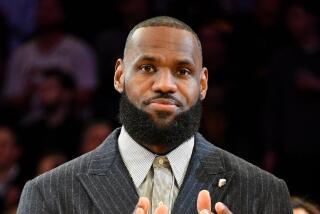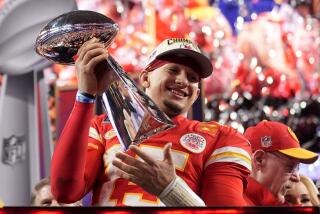Super Bowl champion Malcolm Jenkins on football and fashion
Malcolm Jenkins is a multifaceted man.
He’s an undisputed star on the gridiron — a two-time Super Bowl champion, a two-time Pro Bowler, a Walter Payton Man of the Year nominee and captain of the champion Philadelphia Eagles. He’s also a social activist and is the cofounder of the NFL Players Coalition, an organization that fights injustice against African-Americans. His fist-raising statement during the playing of the national anthem and his willingness to take on President Trump when the team was disinvited to the White House after winning the Super Bowl are well-known.
What may not be as well-known is Jenkins’ fondness for fashion. Not only was he named one of Sports Illustrated’s Top 50 Most Fashionable Athletes last year, he was also singled out for his style at the ESPY Awards when he wore a burgundy made-to-measure suit, Chelsea boots and colorful Kufi skull cap.
The suit was actually a statement in and of itself. It was created by Damari Savile, Jenkins’ made-to-measure business in Philadelphia, that he opened last year with entrepreneur Jay Amin. The 3,000-square-foot store on Walnut Street caters to men seeking to create looks that express their distinct style.
He also has a bow-tie business, Rock Avenue, that he established in 2013 after being unable to find ties that he liked. He’s often seen wearing a hat — he’s a fan of Goorin Brothers and says he wears the caps to hide his bald head — and his most recent project is his “You Aren’t Listening” T-shirts.
Following Trump’s rescinding the invitation for the Eagles to visit the White House on the grounds that NFL players disrespect the country by kneeling during the national anthem, the media peppered Jenkins with questions about the issue. But instead of answering them, he simply held up a series of signs detailing various statistics about social injustice in the U.S. He also hung a hand-lettered T-shirt by his locker that read: You Aren’t Listening.
That spawned a new business, and the sale of the Ts are earmarked to support “quality education, opportunities and essential resources” for children. All proceeds from the sale of the shirts support the Malcolm Jenkins Foundation, a nonprofit organization that is committed to youth development in underserved communities.
With all of this as a backdrop, it wouldn’t be a surprise if Jenkins were aggressive and preachy. But one-on-one, he’s the polar opposite: he’s soft-spoken and unassuming with a quick laugh and a healthy appreciation for what his fame and fortune have allowed him to achieve off the football field. And if he ever feels his head starting to swell, he knows what to do. “While I have the opportunity to live a certain lifestyle, all it takes is a visit to my grandmother’s house in Newark, N.J., to remember there are a ton of people out there in need,” he said.
Born in New Jersey, Jenkins developed his love of football playing in the streets in Piscataway for fun and “never even dreamed of being in the NFL.” When his father signed him up for organized football, Jenkins admitted: “I hated it. I quit the first two years because in my mind, I thought all my friends were back at home playing in the streets. But once I quit, I realized, they were all at practice too and now I was at home by myself.”
He also realized that he was really good at football and at a camp he attended during high school, he was immediately offered a college scholarship to attend Ohio State.
“So now I’m in college and I thought, this is great, I’m going to school for free. But I didn’t really think about the NFL until I saw some upper-classmen get drafted, and I thought, I can be at least the kind of player they are, so maybe I have a shot at the NFL.”
Turns out he did and after snagging All-American honors and winning the Jim Thorpe Award for the nation’s best defensive back in his senior year, he was selected by the New Orleans Saints in the first round of the 2009 NFL draft and signed a five-year, $19 million contract.
He was part of the team that brought the Saints its first Super Bowl victory in 2009 and he remained there until becoming a free agent in 2014. Jenkins signed a $16.25 million, three-year deal with the Eagles and since then, has become the team captain and a leader both in the locker room and the league.
While he’s proud of his accomplishments, Jenkins is perhaps even prouder of his two Super Bowl championships because of what it meant to the cities he played in.
Coming four years after Hurricane Katrina devastated New Orleans, “what that team and that win meant to that city was unlike any other,” he said. “I remember leaving the parade and thinking, no one will ever have a parade like this.”
But Philadelphia did its best to celebrate its first championship this year.
“You have a very thirsty, hungry and passionate fan base,” he said. But for him personally, being the team captain and a key contributor made it especially meaningful. “And the parade was far and beyond anything I had expected.”
He said the parade down Broad Street drew an estimated 2 million people. “The Pope only had like a million or something like that,” he said. “It just goes to show how much that team means to that city.”
Even so, don’t expect to see Jenkins sporting his Super Bowl rings anytime soon.
“You have to have security with those,” he said with a laugh. “They’re big and significant. The day we got the Eagles ring was the first time I’d worn my Saints ring in two or three years. Once I get them, I put them in the safe and my whole mentality is about trying to get another one. But I’m sure when I’m done playing I’ll wear them pretty often just so people don’t forget about me.”
He realizes he needs to embrace his celebrity while he can.
In his self-deprecating way, Jenkins said: “Things have fallen into place for me, and the higher I climb in my profession, the more responsibility I feel to branch out and use the platform as much as I can. What I’ve always known is that football has never been the end-all, be-all for me. It’s something I do well and I love, but there’s going to be a life after football.”
Now officially the “old guy” in the locker room at the age of 30, Jenkins knows that his playing days are nearing an end.
“I’m getting ready to begin my 10th season, which is a huge milestone in our profession,” he said. “It’s inevitable and I’m getting closer and closer to the end of my career. But also I’ve always wanted when I leave the game for people to remember me for more than just what I did on the field. Because quite frankly, there’s going to be somebody coming up behind me who’s better, records will be broken and people move on, but what doesn’t leave is your impact on the world. And so I’ve tried to make sure that while I have this stage and platform that I utilize it.”
So in addition to his social activism, Jenkins hopes he’ll also have a long career in fashion.
He plans to eventually expand Damari Savile beyond the one store in Philadelphia and launch a ready-to-wear collection. The line has created a following with athletes in the NFL, NBA and Major League Baseball — as well as with regular guys — and Jenkins is enjoying the process.
“Eventually we’d like to grow the store to different markets, but right now, we’re having fun just creating a product that people love and helping people find their own styles. I’m really looking forward to the ESPYs because I’ve got a couple of my teammates that we’ve done looks for. Last year was my first time going to the ESPYs and doing a red carpet like that so to be able to wear my own outfit was really cool and we made a ton of best-dressed lists. I take pride in that,” he said.







